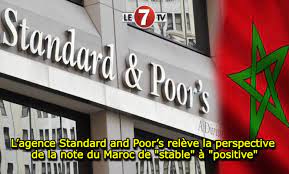
American credit rating agency Standard & Poor’s has affirmed Morocco’s long- and short-term local and foreign currency sovereign credit ratings at ‘BB+/B’ with positive outlook.
The agency said Morocco’s economy has proven resilient in the face of multiple shocks over the past five years, and maintained access to domestic and external financing.
“We believe that the continued implementation of socioeconomic and budgetary reforms will help formalize the economy further and make it more inclusive and competitive, thereby stimulating GDP growth and bringing down budget deficits, albeit gradually”, said the analysts of S&P Global ratings.
The country’s budget and current account deficits decreased more than we expected in 2023, to 4.4% and 0.6% of GDP, respectively, said the U.S. financial agency, noting that it expects fiscal consolidation to continue.
“We therefore revised our outlook on Morocco to positive from stable and affirmed our ratings at ‘BB+/B’”, underlined S&P, explaining that the positive outlook reflects its expectations that the North African Kingdom will build on its recent track record of implementing socioeconomic and budgetary reforms, paving the way for stronger and more inclusive growth, and a reduction in budget deficits.
According to the agency forecast, Morocco’s annual economic growth will accelerate and average 3.6% in 2024-2027 supported by robust exports and domestic demand, while the budget deficit will decline to 3% of GDP by 2027.
Inflation had become more broad-based, but will decelerate gradually to 3.6% in 2024 and approach 2.0% in 2027, from 6.1% in 2023. The Moroccan economy has weathered several global, regional, and local headwinds in recent years.These included the surge in energy and food prices tied to the Russia-Ukraine war, the COVID-19 pandemic, and multiple drought episodes. Nevertheless, it has maintained unfettered access to external and domestic financing.
In 2023, the number of tourist arrivals in Morocco was 12.3% above 2019 pre-pandemic, a better performance than the global average, despite the earthquake in the Marrakesh region in September 2023.
The current account deficit narrowed to 0.6% of GDP in 2023, against our previous estimate of 2.7%, partly reflecting the continued diversification in the economy; Morocco’s main export-oriented sectors are now tourism, automotive, and phosphates.
According to S&P projections, the expansion of social protection, combined with increasing digitalization, will enable Morocco to formalize more of the economy and make it more inclusive, and eventually widen the tax base.
The number of people benefiting from the mandatory health insurance scheme has more than doubled since 2021. The Moroccan government also implemented a unified registry to better target households eligible for social support programs, and will undertake a population census in 2024.
A series of business-friendly reforms were carried out in Morocco in a bid to prioritize investment in water and energy, and the modernization of the legal, institutional, and regulatory framework.
The government amended the Investment Charter at the end of 2022; it aims to increase the share of both domestic and foreign private investment to two thirds of total investment by 2035, from approximately one third currently.
